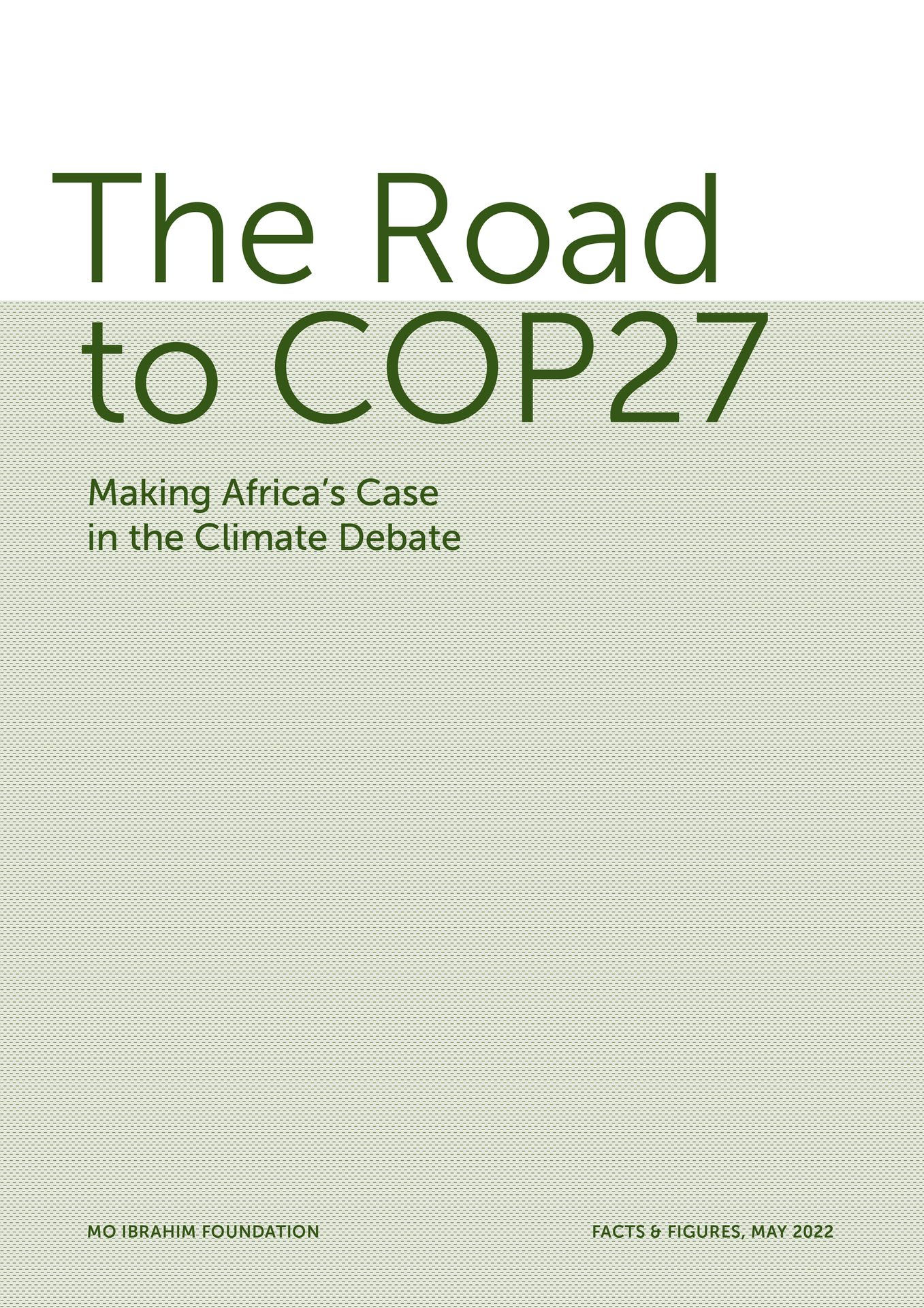Download document

Following the Ibrahim Governance Forum, the Mo Ibrahim Foundation published the Ibrahim Forum Report, The Road to COP27: Making Africa’s Case in the Climate Debate, combining the latest data on the climate crisis in Africa with the key takeaways from the Ibrahim Governance Forum, putting forward 15 recommendations for how policymakers and climate leaders can articulate Africa’s case in the global climate debate and ensure the continent’s interests are no longer marginalised.
Africa is blessed with extraordinary wealth in biodiversity and natural resources, all of which are crucial assets at both regional and global levels in the transition towards a more sustainable future.
The continent is home to key carbon sinks such as the Congo Basin forests of Central Africa, which absorb an estimated 1.1 billion-1.5 billion tonnes of carbon annually.
This is equal to 4% of the global carbon emissions every year, offsetting more than the whole African continent’s annual emission.
Africa holds ecological and mineral assets that are key for the world

Annually, the Congo Basin offsets more than the total carbon emitted by the entire African continent
Africa also possesses 30% of the world’s mineral reserves, including minerals that are critical to renewable and low-carbon technologies such as solar power and electric vehicles.
Global demand for these technologies is set to skyrocket, meaning production of minerals such as lithium, graphite and cobalt will need to increase nearly 500% by 2050. This simply cannot be achieved without African minerals.
Africa possesses 30% of the world’s mineral reserves
The production of minerals such as lithium, graphite and cobalt will need to increase nearly 500% by 2050





If these resources are to benefit both Africa’s people and the planet, lessons must be learnt from the continent’s past experience with mineral resources such as oil and diamonds.
African governments must promote sound governance and inclusive institutions, ensuring that transparency, accountability and effective resource management sit at the heart of Africa's agenda.
Good governance at the heart of a sustainable future

We have this incredible continent with phenomenal things under the grounds, and in the oceans as well. This is the opportunity to add value to the assets we own and turn them into real commercial wealth for the continent as well as wealth for its people.
Nasi Rwigema
Seven of the ten African countries most exposed to climate change score below the African average for Overall Governance.
Strengthening public and resource governance is key for economic development and avoiding the so-called resource curse that characterised the continent’s experience with other natural resources.
Harnessing Africa’s potential – both in terms of natural resources and human resources – will be vital to accelerating the transition towards a greener, more sustainable economy for Africa and the world.
Mo Ibrahim

There is no resource curse, just good or bad governance.
Realising this potential and the role of financing
Africa’s natural wealth, be it green, blue or mineral, consistently showcases the continent’s central role in a low carbon future.
However, translating these assets into effective development will require financing.
Twelve years ago, at COP15 in Copenhagen, wealthy nations pledged to commit $100 billion annually by 2020 to assist global climate change responses. This pledge has never been realised, and just 5% of total climate finance outside the OECD flows to sub-Saharan Africa.
Even the $100 billion is well short of the $2 trillion a year in climate funding that developing countries will need by 2030 to cut their emissions
Domestic resources and private capital must be mobilised
It is right for wealthy nations to support climate financing in Africa. However, domestic revenue will also play a critical role in financing a more sustainable future.
Domestic funds will need to be mobilised more effectively in order to achieve plans to cut emissions and adapt to climate impacts, address the energy deficit, build green economies and green supply chains, and climate-proof development agendas.
Improving tax efficiency could raise tax revenue by +3.9% of GDP, whilst better control of corruption and effective enforcement of existing laws could reduce administrative inefficiencies and raise an additional $110 billion per year in revenue on the continent.
Improving tax efficiency could raise tax revenue by +3.9% of GDP

Tax
%
If the finance and governance requirements are met, African countries can begin to develop green economies that benefit both their people and the planet.
30,000 jobs could be created for every $1 million invested in conservation agriculture, with the potential to sequester up to 372 million tonnes of carbon dioxide from the atmosphere per year, globally
Nigeria’s reforestation drive is projected to create 20,000 jobs and capture 565,000 tonnes of carbon per year
Expanding renewable power across the continent could generate 190,000 direct & 160,000 indirect jobs in solar by 2030 and 60,000 direct & 50,000 indirect jobs in the wind industry
Overcoming investment and governance hurdles will enable Africa to unleash its true potential and deliver a global sustainable future that benefits all the world’s citizens.
A strong green economy is a strong economy

Key recommendations for COP27
Raise awareness of Africa’s assets and Africa’s ability to be a key stakeholder of a global green economy – not just a victim of the climate crisis
Avoid the ‘resource curse‘: add local economic value and prioritise governance
Assess – and monetise – Africa’s carbon-sequestration potential
Consider climate change as a key development opportunity for Africa.
Transparency, accountability and governance are key at both national and global levels in the process of resource extraction and trade.
African countries should be duly compensated for the preservation of these global assets, including with a price on carbon storage.



Mo Ibrahim
There is no development without power.

If we were able to put a price to carbon storage in Africa, we would be able to create 136 million jobs.

Vera Songwe

COP27: Taking stock of progress
To what extent have the Mo Ibrahim Foundation's 15 recommendations to make Africa’s case in the global climate debate been addressed?




